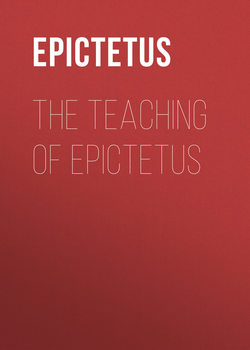Читать книгу The Teaching of Epictetus - Epictetus - Страница 4
BOOK I
CHAPTER II
on the natural conceptions
Оглавление1. The natural conceptions are common to all men, and one cannot contradict another. For which of us but affirms that the Good is profitable, and that we should choose it, and in all circumstances follow and pursue it? Which of us but affirms that uprightness is honorable and becoming? Where, then, doth the contradiction arise? Concerning the application of the natural conceptions to things severally. When one saith, He did well, he is a worthy man, and another, Nay, but he did foolishly, then there is a contradiction among men, one with another. And there is the same contradiction among the Jews and the Syrians and the Egyptians and the Romans; not whether that which is righteous should be preferred to all things and in all cases pursued, but whether this be righteous or unrighteous, to eat the flesh of swine. And ye can discover the same contradiction in the matter of Achilles and Agamemnon. For call them before us: What sayest thou, Agamemnon, Should not that which is right and fair come to pass?
– “That should it.”
And what sayest thou, Achilles, Doth it not please thee that what is fair and right should be done?
– “Of all things this doth most please me.”
Then make application of your natural conceptions. Whence arose this dispute? The one saith: I am not bound to deliver up Chryseis to her father. And the other saith: Thou art bound. Assuredly one of them must ill apply the conception of duty. And again the one saith: Therefore if I should deliver up Chryseis, it is meet that I take his prize from one of you. And the other: Wouldst thou, then, take from me my beloved? He saith: Yea, even thine. And shall I alone, and I alone, have nothing? And thus ariseth the contradiction.
2. What is it, then, to be educated? It is to learn to apply the natural conceptions to each thing severally according to nature; and further, to discern that of things that exist some are in our own power12 and the rest are not in our own power. And things that are in our own power are the will, and all the works of the will. And things that are not in our own power are the body, and the parts of the body, and possessions and parents and brethren and children and country and, in a word, our associates. Where now shall we place the Good? To what objects shall we apply it? To those which are in our own power? Then is health not good, and whole limbs and life? and are not children and parents and country? And who will bear with you if you say this? Let us, then, transfer it to these things. Now, can one be happy who is injured, and has missed gaining what is good? He cannot. And can such a one bear himself towards his fellows as he ought? How is it possible that he should? For I have it of nature that I must seek my own profit. If it profits me to own a piece of land, it profits me to take it from my neighbor. If it profits me to have a garment, it profits me to steal it from the bath. And hence wars, seditions, tyrannies, conspiracies. And how shall I be able to maintain a right mind towards God? for if I suffer injury and misfortune, it cannot be but He neglects me. And what have I to do with Him if He cannot help me? And, again, what have I to do with Him if He is willing to let me continue in the evils in which I am? Henceforth I begin to hate Him. Why, then, do we build temples and set up statues to Zeus as we do to powers of evil, such as Fever?13 And how is He now the Saviour and the Raingiver and the Fruitgiver? And verily, all this follows, if we place anywhere in external things the nature and being of the Good.
12
τὰ μέν εἰσιν ἐφ’ ἡμῖν, τὰ δὲ οὐκ ἐφ’ ἡμῖν. A fundamental distinction in the Epictetean system, which he sometimes expresses by the phrases, τὰ ἡμέτερα and τὰ τῶν ἄλλων – things that are our own and things that belong to others; or τὰ ἴδια and τὰ ἀλλότρια – things that are our proper concern, and things that are alien to us.
13
On the Mons Palatinus in Rome there stood a temple to Fever. Upton quotes from Gruter, p. xcvii., an interesting inscription to this divinity: Febri. Divæ. Febri. Sanctæ. Febri. Magnæ. Camilla. Amata. Pro. Filio. Male. Affecto. P.
